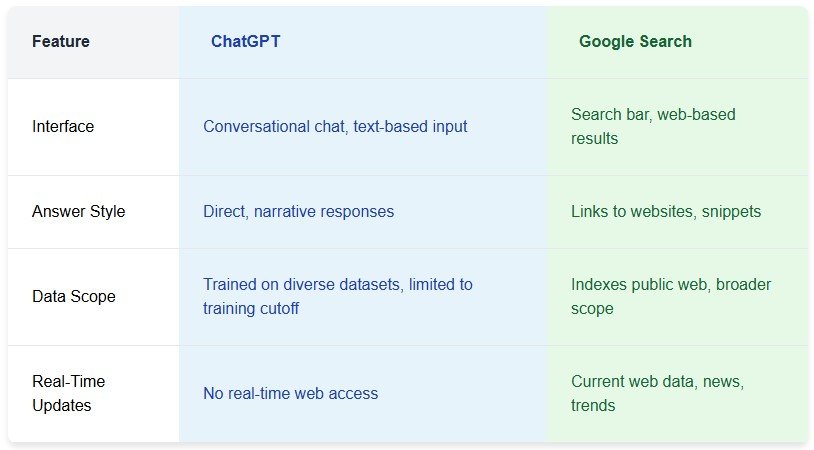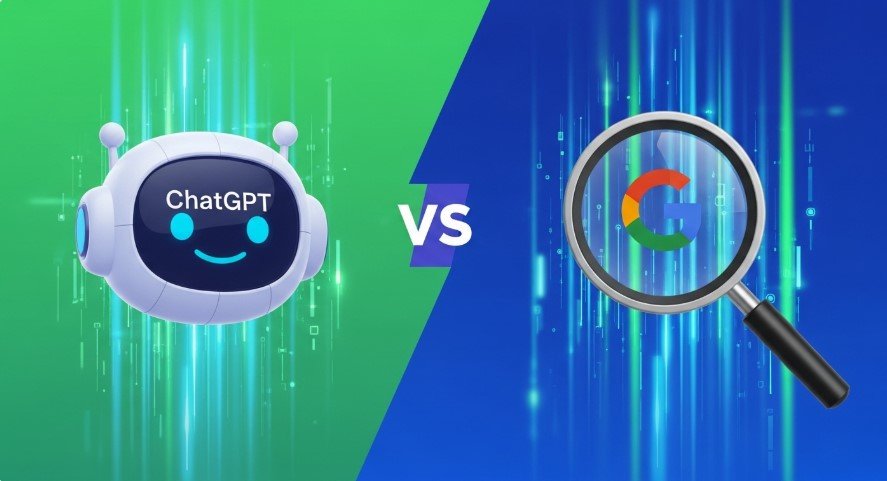In 2025, finding information online is easier than ever, but the tools we use are changing. ChatGPT’s search feature, launched in October 2024, offers a new way to get answers. Traditional search engines like Google still dominate. So, how do they compare? This guide breaks down their differences, strengths, and best uses to help you choose the right tool. We’ll also share tips for marketers to stay visible in this evolving landscape.
How ChatGPT Search Works
ChatGPT search, powered by OpenAI’s GPT-4o model, lets you ask questions in plain language. It delivers direct answers, pulling real-time data from partners like Microsoft Bing, Reuters, and The Associated Press OpenAI. For example, ask, “What’s the latest on electric cars?” and it summarizes recent news with source links. You can follow up with more questions, and it keeps the context, making it feel like a conversation.
How Traditional Search Engines Work
Traditional search engines like Google crawl billions of webpages to index information. You type keywords, and they return a list of links, images, videos, or maps. Google’s AI Overviews, introduced in 2024, add summaries to some results, but the core is still link-based. This makes Google great for finding diverse sources or real-time data like weather or local businesses.
Key Differences Between ChatGPT and Google
Here’s how ChatGPT and Google stack up:
- Interface: ChatGPT offers a conversational chat format. Google provides a list of links with multimedia options.
- Answers: ChatGPT gives direct, summarized responses. Google requires clicking through links for details.
- Data Sources: ChatGPT uses training data and partner feeds. Google indexes the entire web.
- Real-Time Info: Google updates constantly. ChatGPT relies on third-party providers, which can be limited.
| Feature | ChatGPT Search | Google Search |
|---|---|---|
| Interface | Conversational chat | Link-based with multimedia |
| Answer Style | Direct summaries | Links to sources |
| Data Scope | Training data + partners | Billions of webpages |
| Real-Time Updates | Limited | Extensive |

Strengths and Weaknesses
ChatGPT Search
Strengths:
- Understands natural language questions.
- Keeps context for follow-up queries.
- Provides clear, summarized answers.
- Feels personal and user-friendly.
Weaknesses:
- Limited real-time data compared to Google.
- May give incorrect answers (AI hallucinations).
- Fewer sources than traditional search.
- No image or video searcht.
Google Search
Strengths:
- Indexes billions of webpages for broad coverage.
- Updates in real time for news, weather, and more.
- Offers images, videos, and maps.
- Ranks reliable sources high.
Weaknesses:
- Results can feel overwhelming with many links.
- Requires clicking to find specific answers.
- Relies on keywords, not always context PageOne.ai.
Can ChatGPT Replace Google?
Many wonder if ChatGPT could overtake Google. In 2024, Google handled 5 trillion searches with a 93.57% market share, while ChatGPT’s search-like queries were just 0.25%. Also, 99% of AI platform users still use traditional search. Google’s vast index and real-time updates make it better for research-heavy or local queries. ChatGPT shines for quick, conversational answers but struggles with accuracy and scope. They’re more likely to coexist than compete.
When to Use Each Tool
- Use ChatGPT for: Quick explanations, summaries, or conversational queries like “Explain quantum physics simply.”
- Use Google for: In-depth research, local searches (e.g., “restaurants near me”), or multimedia like images and videos.
- Combine Them: Start with ChatGPT for a summary, then use Google to verify details or explore more sources.
For tips on using ChatGPT effectively, see our post on How to Use ChatGPT for UX Research.
The Future of Search
Both tools are adopting AI. Google’s AI Overviews summarize results, while ChatGPT integrates real-time data with models like GPT-4o and o1. User-generated content, like Reddit, is also gaining importance in Google’s rankings, showing a shift toward diverse voices. The future likely involves hybrid systems blending AI answers with traditional search.
Tips for Marketers
To stay visible in 2025, marketers must adapt to both tools:
- Write for Humans and AI: Use clear, natural language with long-tail keywords.
- Focus on Quality: Create detailed, trustworthy content to rank in Google and be cited by ChatGPT.
- Use Structured Data: Add schema markup (e.g., FAQs) to help AI parse your content.
- Engage Communities: Contribute to platforms like Reddit to boost visibility in Google’s Helpful Content Update.
Learn more about AI-driven SEO in our post on ChatGPT vs. Semrush SEO Optimization.
Conclusion
ChatGPT and Google serve different needs in 2025. ChatGPT offers fast, conversational answers, while Google provides comprehensive, real-time results. With Google’s 93.57% market share and ChatGPT’s 0.25%, both are vital tools. Use ChatGPT for quick insights and Google for deep research. Marketers should optimize for both to reach more users.
